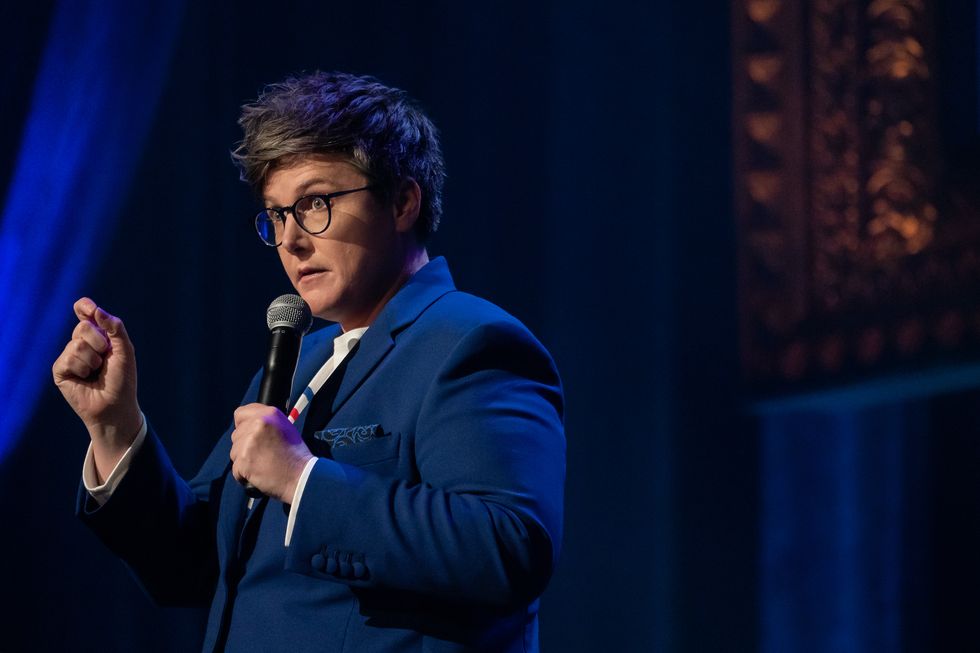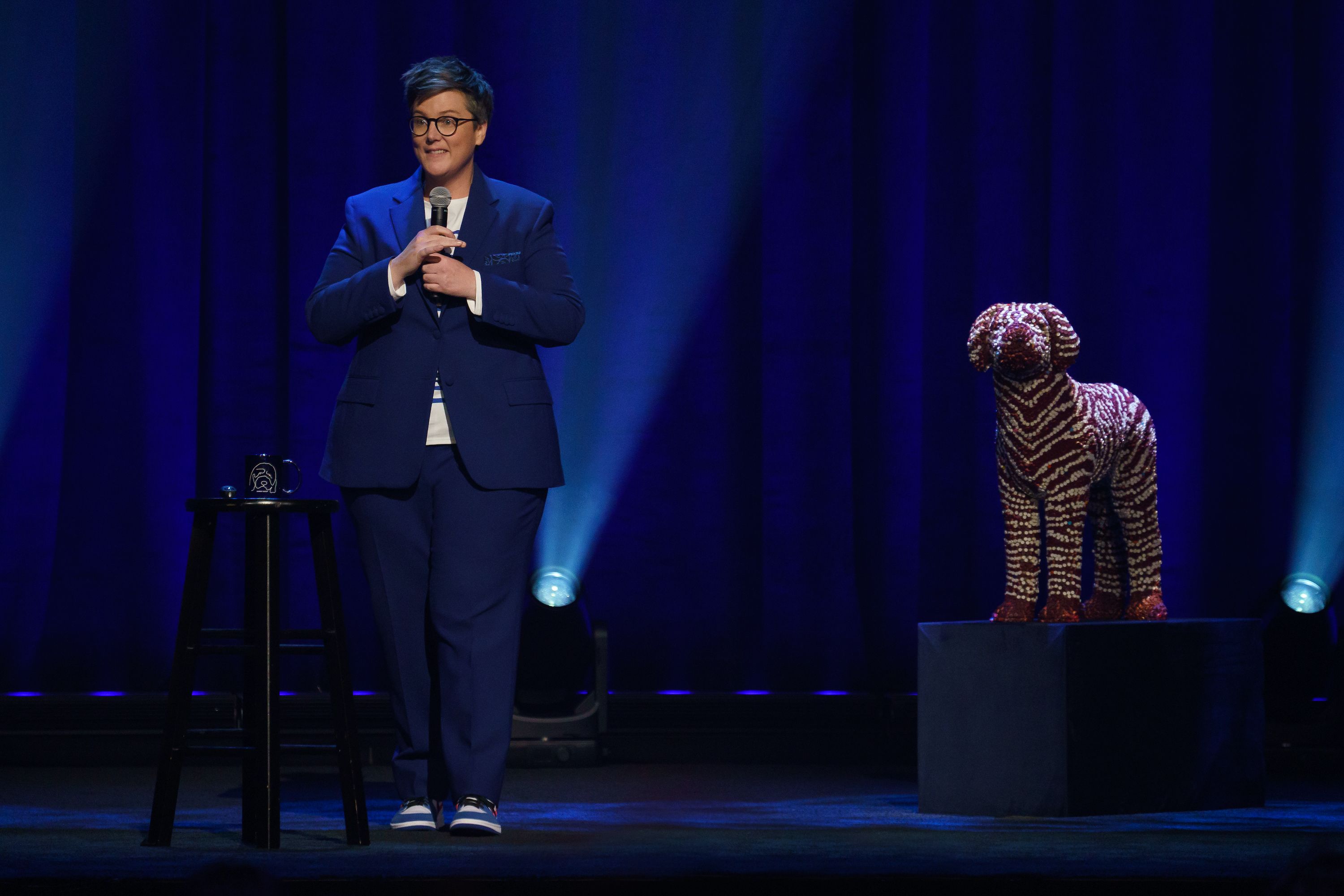
Hannah Gadsby's Douglas Is a Second Date Disguised as Stand-Up
by R. Eric ThomasIt would be easy to describe the strategy Hannah Gadsby employs in her stand-up act, which includes the specials Nanette and now, Douglas, as a trick. The Australian comedian has a sly style of presentation that knits together connections in plain sight but still dazzles in the reveal. She shows her cards like a sleight-of-hand illusionist, telling you what she's going to do and how she's going to do it, but when she presto-changos the punchline, it still has the thrill of magic. Of course, it's not a trick, but rather a carefully and deliberately constructed mix of narrative, jokes, and art history commentary. And though it's tempting to describe her work, complimentarily, as a trick, it's clear that with Douglas, Gadsby is endeavoring to make herself as transparent and legible as possible.
Not that her intention will stop those who dislike her from crying foul, as some did when the debate over whether Nanette was technically stand-up bubbled up. "I got accused of doing all sorts of nefarious things in lieu of comedy," Gadsby reveals in Douglas. "Like a monologue. What a monster, if true." As in Nanette, Gadsby freely jumps from observational humor to personal stories to polemical critique. However, she calls Douglas a romantic comedy, and it's possible she's serious about that. In all fairness, in the end, she's a comedian standing in front of a room, asking it to love her. Also, facing the almost insurmountable buzz that heralded her first special, she's trying to build on the good vibes while embarking on a new path. In this way, Douglas is less a full rom-com with its trials and tribulations, and more a really promising second date: a little looser, a little more fun, and daring in a different way. This may be a lot to put on a stand-up special, but Gadsby can take it. It's all part of the act.
This content is imported from YouTube. You may be able to find the same content in another format, or you may be able to find more information, at their web site.
In her second filmed outing, Gadsby harnesses all the critiques lobbed at her and deftly incorporates them into her act, creating a stand-up routine that functions even better as an experiment with form. Responding to claims that she lectures onstage, she opens with a fifteen-minute preamble that outlines the entire show and, later, grabs a clicker and fires up a slide show to make a point about Renaissance art. This mix of exposition and education will be familiar to fans, but it takes on a giddy new air in Douglas. Here, the comedian is riding high on the unexpected but earned success of Nanette, but she's also dogged by it. Instead of crumbling under the unmanageable expectations that await her in this second go-round, she ramps them up even higher in her prelude, telling the viewers where we'll laugh and where we'll be shocked. It's a gambit that doesn't always pay off, but it proves Gadsby has more on her mind than punchlines. She's trying to deconstruct the comedy special as a whole and rebuild it as an engine for communication.
Sure, the comedian's style isn't typical of stand-up, but a quick perusal of the current slate of stand-up offerings proves there's no such thing as typical stand-up anymore. Lil Rel Howery's excellent Live in Crenshaw begins with "Lift Every Voice and Sing" and follows the comedian working through unscripted material as the sun sets in a gymnasium. Seth Meyers's Lobby Baby takes advantage of Netflix's technology to enable users to skip all of his Trump jokes. Nick Kroll and John Mulaney's Oh, Hello finds the two comedians in character as elderly New Yorkers. The umbrella of "stand-up special" has always been larger than it seems, and Gadsby's self-aware mix of approaches fits in comfortably. Besides, it's not like she's unaware of what she's doing when she drops from punchlines to a serious discussion of assault in Nanette. "If I had to trick people by calling it comedy, that’s technically a joke," she surmises cheekily in Douglas.

For all her meta-textual playfulness, Gadsby is also deeply invested in the central narratives of her specials. In Douglas, they include her recent diagnosis of being on the autism spectrum, and a lifelong experience of being regularly misunderstood. And so the road map that begins the special, the callbacks that underscore her punchlines, and the digressions and seeming free-associations all work together to provide a vocabulary with which the viewer can read her work. This isn't to say that Gadsby is inscrutable without translation; rather, that her project plays out with words, story, and art until a common truth comes out.
Perhaps the best example comes as she's midway through a section on her autism diagnosis and begins a series of jokes about the anti-vax movement. She quips that she knows some people in the audience won't like the jokes because she's certain some people in the audience are anti-vaxxers themselves: "My core demographic is rich white entitled women and that is a Venn diagram with a lot of crossover."
Gadsby isn't trying to change the facts of her act—what its components are or who its intended audience is. Instead, she's taking it upon herself to widen the umbrella under which she works. Yes, some parts are lectures and some parts are traditional jokes and yes there's a lot to live up to after Nanette and yes she's still super into pointing out patriarchal bullshit in art history. And, yes, all of it is a stand-up special. Or, at least, it's this stand-up special. And it makes for a pretty magical date with one of comedy's most unique communicators.
This content is created and maintained by a third party, and imported onto this page to help users provide their email addresses. You may be able to find more information about this and similar content at piano.io
This commenting section is created and maintained by a third party, and imported onto this page. You may be able to find more information on their web site.